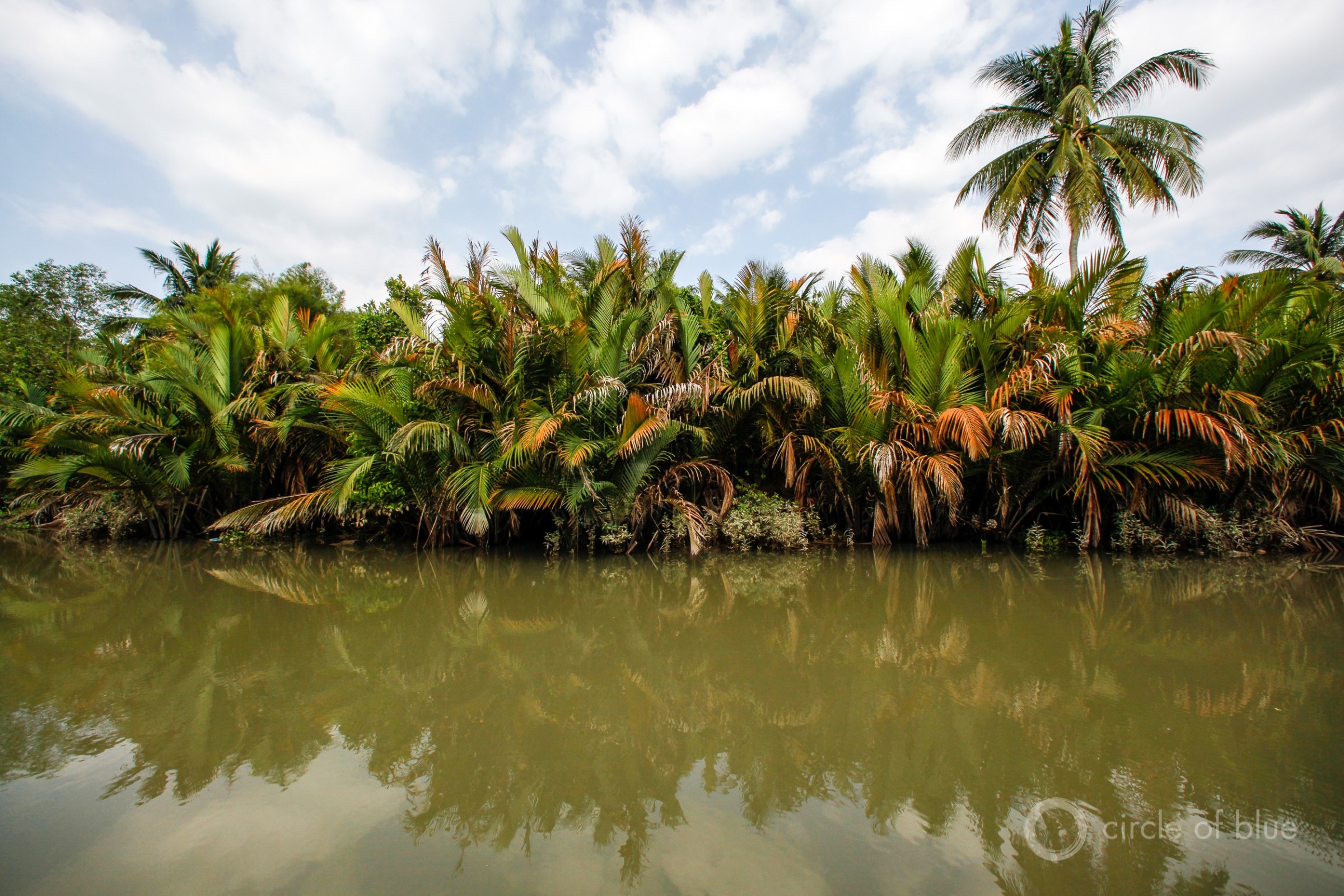The Stream, September 6, 2023: Global Study Reveals Damage to Tropical Rivers from Mining Them

Palms line a river channel in the Mekong delta. Photo © J. Carl Ganter/Circle of Blue
YOUR GLOBAL RUNDOWN
- A controversial luxury home development in British Columbia threatens a local wildlife corridor’s waters and at-risk species.
- Powered by water from the Seine River, Paris plans to develop a ‘green’ urban cooling system.
- A global study spanning four decades and thousands of riparian miles reveals the devastating impact of river mining in the tropics.
- A tropical storm, formerly Typhoon Haikui, battered southern China in the country’s latest large flood.
A new investigation reveals America’s groundwater crisis — draining aquifers at an alarming rate — is more substantial than commonly thought.
“From an objective standpoint, this is a crisis. There will be parts of the U.S. that run out of drinking water.” — Warigia Bowman, a law professor and water expert at the University of Tulsa.
Over the past decade, four out of every 10 underground water wells hit record lows, the New York Times reports. The finding is part of an extensive investigation into the state of America’s groundwater, which for decades has been used “faster than nature can replenish.” The result, per the Times, is a looming “crisis that threatens American prosperity.”
Much of the crisis is attributed to farmers, cities, industries, and others pumping greater amounts of groundwater than is allowed or sustainable. Losing access to adequate nearby water reserves threatens the country’s crop exports and real estate markets. Too much pumping is causing land to subside and streams to dry up.
Many communities are acutely feeling the impacts of low water pressures or quality.
Global warming is exacerbating the crisis — hotter temperatures evaporate more surface water, “leaving less to seep through the ground to replenish overstressed aquifers.” High-elevation snowpack, which melts and sustains rivers and lakes, is less substantial in a warming world.
In context: U.S. Groundwater Wells Race Toward Bottom
— Christian Thorsberg, Interim Stream Editor
Recent WaterNews from Circle of Blue
- Offering Up Advice For Farmers, Universities Add To US Water Pollution — Formal fertilizer recommendations encourage producers to pour on more.
- Water Migrants: Crisis in the Mediterranean Episode 2 — Countless thousands are risking their lives to flee drought and war in North Africa in search of refuge in Europe.
The Lead
A new study has found that “up to seven percent” of the world’s tropical rivers wider than 164 feet are now “severely impacted” by mining within the streambanks, Mongabay reports.
Based on millions of satellite images, the study identified 173 large rivers in 49 countries that were damaged by miners digging up riverbeds and banks to extract gold, sand, or minerals. The study’s authors also identified thousands of miles of smaller rivers being ecologically harmed by both large- and small-scale mining.
For the study, 396 global mining sites were analyzed, a third of which were established after 2009. The financial crisis of 2007 and 2008 exacerbated the spike in gold mining, experts say. Gold, which accounts for 90 percent of tropical river mining, has “has never dipped below $1,200 [per ounce] in the last five years,” Mongabay reports.
The environmental impacts of river mining are substantial. The process of extraction releases sediment that muddies rivers, chokes out freshwater fish, and dirties water that countless human communities depend upon for drinking, cleaning, and cooking.
This Week’s Top Water Stories, Told In Numbers
90
Number of luxury homes that would comprise a proposed gated community — called the Galloway Lands development — near Fernie, British Columbia, The Narwhal reports. The multimillion-dollar project, which has the backing of influential local politicians and community members, has been met with resistance from environmentalists who say that its construction will irreversibly, negatively impact a local wildlife corridor and its waters. At least 10 at-risk or endangered species — including grizzly bears, the Western screech owl, the American badger, and cutthroat trout — have been identified as being further threatened should the project move ahead. Lizard Creek, a nearby waterway, would be particularly strained by a proposed bridge and runoff pollution from road salt. Those opposing Galloway Lands are citing the province’s Water Sustainability Act as a legal roadblock — requiring the developers to apply and receive permits. First Nations communities have added their support to the opposition.
114,000
Number of people evacuated from low-lying areas in southeastern China as a tropical storm — formerly Typhoon Haikui — made landfall on the country’s coast, CBS News reports. The storm is the latest in what has been a relentless summer of flooding and heavy rains across China, including recent deadly weather events in Beijing. Bloomberg reports that officials worry that the storm will threaten the rice crop, one of their most important grains.
On the Radar
To meet the city’s demand for air conditioning while steering clear of more carbon emissions, Paris is planning to expand its underground cooling network using water from the Seine River, Reuters reports. River water will cool power stations, which pump cooled water to buildings. This cool water eliminates the need for air conditioning units. By 2042, the city aims to have 155 miles of the network functioning. In the near future, among the buildings to be cooled by the new network are those hosting next year’s Summer Olympic Games.
More Water News
Flooding Man: Tens of thousands of ‘Burning Man’ festival goers, told to shelter-in-place, were stranded in the northern Nevada desert amidst flash rains and flooding, AP reports.
Global Water Organization: Saudi Arabia has announced the founding of an international organization, the Global Water Organization, to address and share water challenges, shortages, technologies, and solutions, the Middle East Monitor reports.
Christian Thorsberg is an environmental writer from Chicago. He is passionate about climate and cultural phenomena that often appear slow or invisible, and he examines these themes in his journalism, poetry, and fiction.






Leave a Reply
Want to join the discussion?Feel free to contribute!